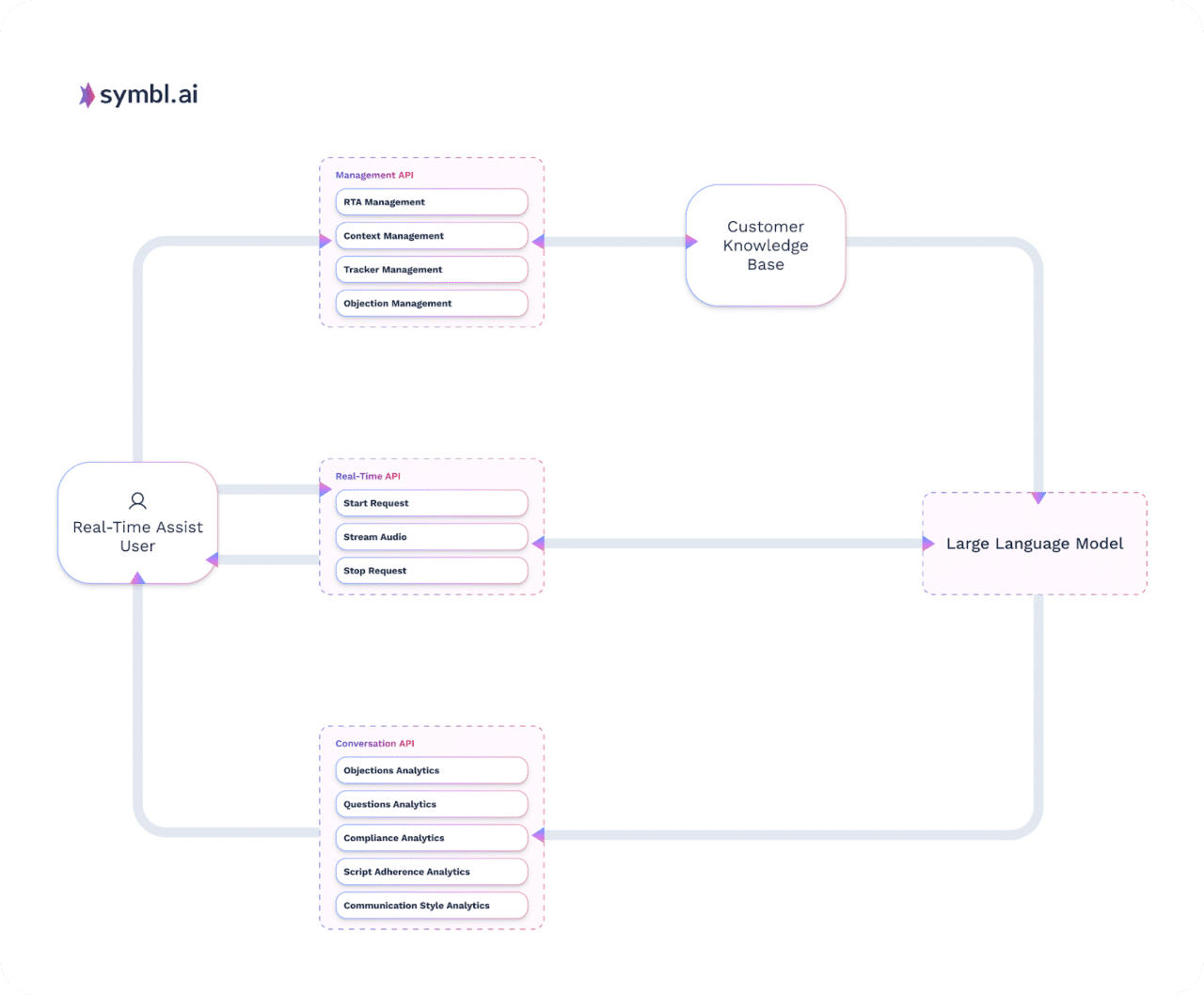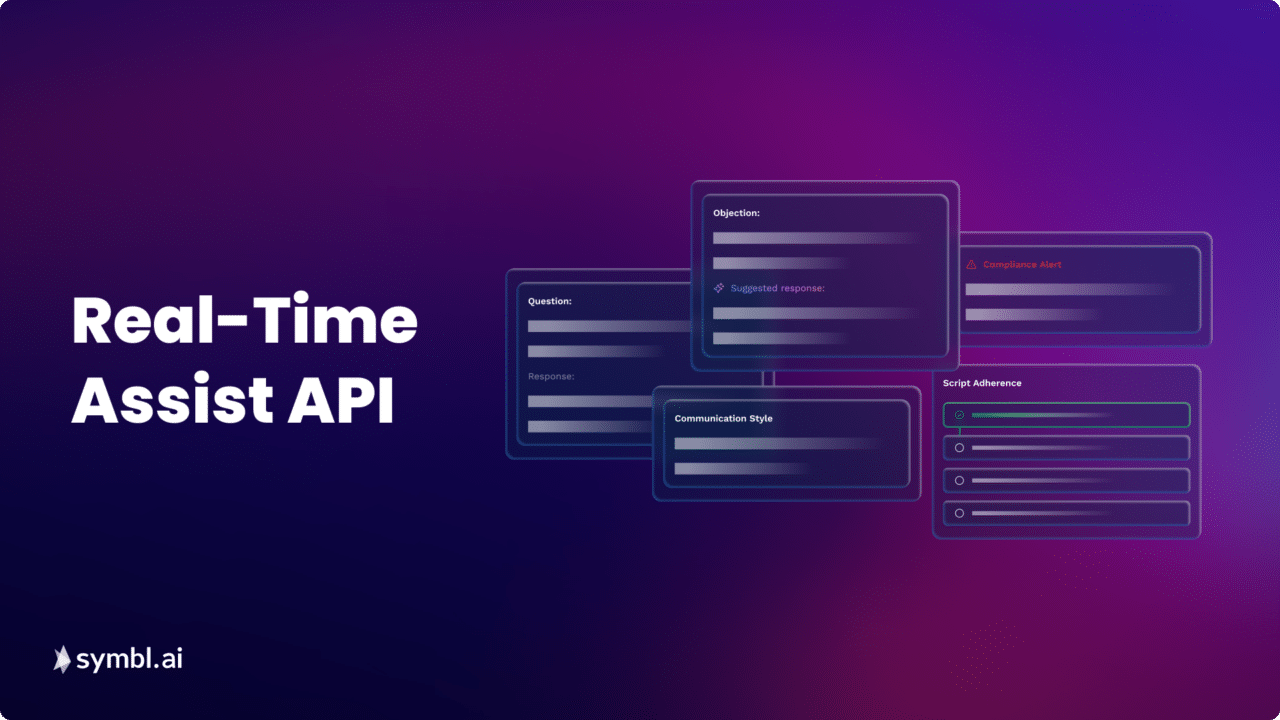We’re excited to introduce Symbl.ai’s Real-Time Assist API, the latest addition to our suite of generative APIs. The API empowers enterprises to bring in advanced real time AI capabilities such as contextual guidance to handle objections, compliance violations, and script guidance without extensive development and operational overhead. Enterprises can now reduce time-to-value for live assistance from months to days, enabling faster go-to-market without compromising quality.
The Challenge
For enterprises looking to build effective real-time agent assistance capabilities, the journey has been fraught with complexity, long development cycles, and resource-intensive maintenance.
Fragmented Technology Stack
Creating a real-time assistance solution typically involves manually integrating various components—Automatic Speech Recognition (ASR) systems, event detection models, knowledge bases, and Large Language Models (LLMs)—into a unified pipeline. Each of these components demands time-consuming evaluation and benchmarking, leading to extended setup times and a high risk of misalignment and failure. Additionally, building low-latency, scalable solutions with a fragmented technology stack is challenging. Integrating systems from different vendors can increase processing times and latency in delivering real-time insights. This delay hampers agents’ ability to respond swiftly, ultimately reducing the effectiveness of real-time assistance. As the volume of live calls rises, each component must be optimized for high traffic, which can create performance bottlenecks during peak demand.
Delayed Time-to-Market
Developing a reliable real-time assistance system could take enterprises 4-6 months, significantly delaying the time to market. This lag in deployment also led to delayed returns on investment, as teams struggled to build systems that could accurately detect events like objections, compliance violations, or deviations from scripts and generate real-time, contextually relevant responses.
Maintenance Overhead
Once the real-time assistance system was live, enterprises faced continuous maintenance challenges. Ensuring the system stayed up-to-date with new objections, compliance issues, and business priorities required ongoing manual intervention, making the entire process both expensive and resource-intensive. In some cases, teams had to rebuild or reconfigure key components, further adding to the operational burden.
The Symbl.ai Solution
Symbl.ai’s Real-Time Assist API addresses these challenges by offering an end-to-end, fully integrated solution that simplifies real-time agent assistance while reducing setup time.
Unified Platform for Real-Time Guidance
With Symbl.ai’s API, there’s no need to manually stitch together different technologies. Symbl.ai integrates ASR, event detection, and real-time response generation into a single API. The system automatically detects critical events—such as objections or compliance risks—during live calls and generates contextually relevant responses using your business’s knowledge base. Built for high-performance environments, Symbl.ai’s Real-Time Assist API ensures low-latency responses, guaranteeing fast, accurate assistance during live interactions, even at scale. Enterprises no longer need to spend months evaluating, integrating, and optimizing disparate tools.
Accelerated Time-to-Value
Symbl.ai’s Real-Time Assist API drastically cuts down the time to deploy real-time assistance, allowing enterprises to go live in days rather than months. The API comes with pre-built event detection capabilities and customizable objection types, ensuring that your teams get up and running quickly while maintaining full flexibility to tailor responses based on your business needs.
Minimal Maintenance with Continuous Improvement
Symbl.ai’s solution is designed to adapt as your business evolves. The API continuously learns from new call data, surfacing new objections and compliance issues so that appropriate guidance can be developed for agents. This ensures that real-time assistance stays relevant and up-to-date. Enterprises can focus on strategic initiatives while Symbl.ai manages the complexity of real-time assistance behind the scenes.
Key Features
- Objection Handling: When a customer raises an objection—whether about pricing, product fit, or competitors—the API instantly provides the agent with relevant data and guidance, increasing the likelihood of a positive outcome.
- Script Adherence: The API ensures agents follow approved scripts, guiding them back on track if they deviate and guaranteeing a consistent, high-quality experience across conversations.
- Compliance Monitoring: Symbl.ai monitors calls in real time, prompting agents to deliver necessary disclosures or follow industry regulations, ensuring full compliance.
- Real-Time Q&A: When customers ask detailed or technical questions, the API provides agents with accurate answers drawn directly from your company’s knowledge base, eliminating delays and enhancing customer satisfaction.
Note: In this initial version, the Real-Time Assist API only supports objection handling. Additional features will be made available in future releases.
How It Works

The diagram above illustrates the different components of Symbl.ai’s Real-Time Assist API, showing how they work together to deliver real-time guidance during live conversations.
- Real-Time Assist User: User who interacts with different components of the API
- Management API: Handles the configuration of essential elements such as Real-Time Assist (RTA) instances, assistants, and context. This ensures Real-Time Assist is tailored to the specific needs of the organization.
- Real-Time API: Facilitates the live streaming of audio and video from your application to Symbl.ai. This API manages the start and stop requests for streaming, processing the data in real-time to generate contextually relevant responses and guidance based on the assistants configured for an RTA.
- Customer Knowledge Base: Provides the necessary data and information that the API references during live interactions to ensure responses are based on organizational context and knowledge. This is where you can add product related information or any necessary information for the assistants you add.
- Large Language Model (LLM): Generates assistant responses by combining the context from the call and the knowledge base.
- Conversation API: Provides post call analytics related to different assistants such as objection handling, Q&A, compliance, script adherence, and communication style.
Get Started
Getting started with the Real-Time Assist API is straightforward and involves two steps:
- Setup RTA:
- Select the assistant type (e.g., objection handling) and specify the objections for the system to address in real time.
- Provide context for handling objections, such as FAQs, sales playbooks, or product information as text documents.
- Stream Live Conversation:
- Stream your live conversation to the Real-Time RTA API via WebSockets and receive instant assistance for the configured assistants.
To learn more, refer to our documentation.
Schedule a demo today to see how Symbl.ai can accelerate your journey to integrating real-time assistance into your platform, driving customer satisfaction and enhancing agent productivity.
